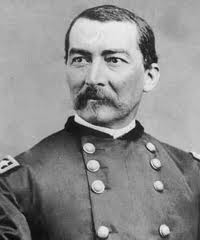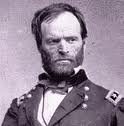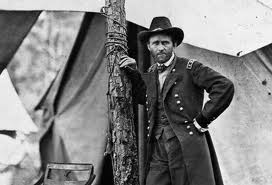 General Philip Sheridan has sometimes been portrayed as an unsung hero of the Civil War, but he ended up being the little engine that could and would. Sheridan was a key player in a three General team that determined the Confederate defeat in 1865. General Grant and Sherman had proven an unbeatable combination in the Western Campaign and Sheridan’s performance and style of leadership captured Grant’s attention. Sherman and Sheridan were similar in their strong character and devotion to duty. Both were tenacious and opinionated and would follow orders to the death, in order to achieve their commander’s goals. Both ended up under Grant’s command and recognized the strategic value of “total war.” General Sheridan first employed a “scorched earth” policy in the Shenandoah Valley Campaign, followed by General Sherman’s similar march through Georgia. They knew that by bringing the horrors of the Civil War to the citizens and partisans of the Confederacy, the support for the southern cause would vaporize. Some historian’s take, on Sheridan, is highlighted by more setbacks than victories. General Philip Sheridan’s entire military career is based on the fact, that no matter what the odds, he would follow orders without question, aggressively and decisively, which was a trait that was hard to find in most Civil War Generals. Sheridan not only proved that he was the little engine that could, but would!
General Philip Sheridan has sometimes been portrayed as an unsung hero of the Civil War, but he ended up being the little engine that could and would. Sheridan was a key player in a three General team that determined the Confederate defeat in 1865. General Grant and Sherman had proven an unbeatable combination in the Western Campaign and Sheridan’s performance and style of leadership captured Grant’s attention. Sherman and Sheridan were similar in their strong character and devotion to duty. Both were tenacious and opinionated and would follow orders to the death, in order to achieve their commander’s goals. Both ended up under Grant’s command and recognized the strategic value of “total war.” General Sheridan first employed a “scorched earth” policy in the Shenandoah Valley Campaign, followed by General Sherman’s similar march through Georgia. They knew that by bringing the horrors of the Civil War to the citizens and partisans of the Confederacy, the support for the southern cause would vaporize. Some historian’s take, on Sheridan, is highlighted by more setbacks than victories. General Philip Sheridan’s entire military career is based on the fact, that no matter what the odds, he would follow orders without question, aggressively and decisively, which was a trait that was hard to find in most Civil War Generals. Sheridan not only proved that he was the little engine that could, but would!
Philip Henry Sheridan, born in New York in 1831, was the son of Irish immigrants. After five rather than four years, he graduated from the United States Military Academy in 1853. Sheridan threatened to run another cadet through, with a bayonet, over a disputed insult, which resulted in “Little Phil’s” extra year at the Academy. His short stature, 5′ 5″, may have played a role in the incident. His first posting was brief, in Texas and Sheridan was next transferred to Northern California where he gained combat and political experience fighting and negotiating with the Native Americans of the Rogue River Valley.
In 1861, at the outbreak of the Civil War his transfer to Jefferson Barracks was detoured by General Halleck, who was Commander of the Missouri, out of St. Louis. Captain Sheridan was assigned, by Halleck, to unravel the alleged fraud of a missing $12 million from Fremont’s failed command of the department. General Halleck promoted Sheridan to Chief Commissary Officer of the Department and assigned him to General Curtis. “Little Phil” not only saw action with Curtis at Pea Ridge in 1862, but in addition, had a falling out with the General over paying for stolen horses, that Sheridan refused to pay for, stating, “No authority can compel me to jayhawk or steal.”
 Captain Sheridan returned to General Halleck’s direct command and participated in a minor role at the siege of Corinth. General Sherman and the strong-willed Captain, became close friends and Sherman lobbied for a promotion, that was ignored. However Sheridan’s ability had not gone unnoticed and acquaintances prevailed, securing for “Little Phil” a promotion to colonel and command of a Michigan Cavalry Regiment in May of 1862. He led his first regimental command successfully at Boonville, Missouri and his bravery and leadership abilities resulted in a promotion to Brigadier General in September of 1862. The little engine that could, had advanced from Captain to General in six months.
Captain Sheridan returned to General Halleck’s direct command and participated in a minor role at the siege of Corinth. General Sherman and the strong-willed Captain, became close friends and Sherman lobbied for a promotion, that was ignored. However Sheridan’s ability had not gone unnoticed and acquaintances prevailed, securing for “Little Phil” a promotion to colonel and command of a Michigan Cavalry Regiment in May of 1862. He led his first regimental command successfully at Boonville, Missouri and his bravery and leadership abilities resulted in a promotion to Brigadier General in September of 1862. The little engine that could, had advanced from Captain to General in six months.
General Sheridan was assigned to command a division under Major General Buell and exhibited stellar leadership at the battles of Perryville, Stones River and the Tullahoma Campaign. However, after attempting to support General Thomas at Chickamauga Creek, his forces covered Rosecrans retreat to Chattanooga, Tennessee and the Confederate siege that followed.
General Grant was ordered to Chattanooga and orchestrated the “break out” of the besieged city and the defeat of Confederate General Braxton Bragg. A key element of this victory was the attack on Missionary Ridge by “Little Phil’s” troopers. Sheridan led his forces, exhorting them with, “Remember Chickamauga” as they routed the Confederate defenders and gained the prominent position, pursuing the retreating rebel army all the way to Chickamauga Station.
Grant always remembered General Sheridan’s bravery and initiative that day and when he went East to command the Army of the Potomac, the new Lieutenant General promoted Sheridan and gave him command of all Union Cavalry in the Eastern Theater. General Grant had left Sherman to win the remaining strategic campaigns of the Western Theater and he had no doubt, that his friend and comrade would successfully accomplish the destruction of the rebellion in the heart of Dixie. Grant hoped that Sheridan could replace Sherman, as Grant’s right hand, in defeating the Confederate forces in the East.
 General Sheridan became the eyes and ears of Grant’s Army and was constantly harassing and raiding Lee’s defenders of Richmond. Although significant victories were few and far between, Grant could always count on “Little Phil” to follow through on his orders and use aggressive tactics in his prosecution of the conflict. General Sheridan and his mounted troopers were ordered by Grant to destroy and devastate all hostile forces and sustenance in the Shenandoah Valley, this area was key to the Confederacy, for its supply, railroads, partisan support and access to Washington. Grant instructed Sheridan thusly,
General Sheridan became the eyes and ears of Grant’s Army and was constantly harassing and raiding Lee’s defenders of Richmond. Although significant victories were few and far between, Grant could always count on “Little Phil” to follow through on his orders and use aggressive tactics in his prosecution of the conflict. General Sheridan and his mounted troopers were ordered by Grant to destroy and devastate all hostile forces and sustenance in the Shenandoah Valley, this area was key to the Confederacy, for its supply, railroads, partisan support and access to Washington. Grant instructed Sheridan thusly,
“The people should be informed that so long as an army can subsist among them recurrences of these raids must be expected, and we are determined to stop them at all hazards…. Give the enemy no rest…. Do all the damage to railroads and crops you can. Carry off stock of all descriptions, and negroes, so as to prevent further planting. If the war is to last another year, we want the Shenandoah Valley to remain a barren waste.”
Sheridan exacted Grant’s orders with a vengeance and to this day residents of the Valley still refer to “Little Phil’s” occupation as “The Burn.”
As General Grant’s forces closed on Richmond, the Confederate troops, commanded by Robert E. Lee, abandoned the rebel Capitol and began a retreat, that was pursued and continually harassed by General Sheridan’s mounted troopers. “Little Phil’s” forces blocked the rebel retreat and forced the surrender of General Lee at Appomattox Court on April 9, 1865.
General Ulysses S. Grant said of Philip Sheridan after the surrender,
“I believe General Sheridan has no superior as a general, either living or dead, and perhaps not an equal.”
In history’s shadow of General’s Grant and Sherman, “Little Phil” Sheridan is an unsung hero of the Civil War and was definitely the little engine that could and would!
Bummer


[…] Learn which documents and ideas influenced the Founding Fathers when drafting the Bill of Rights, and how those rights have been expressed throughout the world. Sheridan Unsung Hero or the Little Engine that CouldCivil War Bummer. […]
I was doing some genealogical arbitration today and came across the name Phil Sheridan, Dept. of Iowa, Grand Army of the Republic, Record Membership and Dues. Post name: Clough. Post #319 (3) Sioux Rapids, My 14, 1884. Phil Sheridan 452 I.S.H. Marshalltown. “Was cousin of Abraham Lincoln.”
Although this was on Dept of Iowa for membership and Dues, no receipt of dues was recorded.
Do you have any details that this Phil Sheridan may be the same one spoken of in your article?
Donna
Bummer does not believe your Sheridan is the same Union Sheridan in this reference. Little Phil of this bio did fight in the Indian plains conflict but died at 57 years and his family settled in the east after his career as commanding general of the US Army. Visit again soon.
Bummer
I love your blog
I have read this article and enjoyed it
Gregory
Thanks for the read and visit again soon.
Bummer
I don’t know how well those qualities served Little Phil when he took over as commanding general of the Army from Sherman during the height of the Indian Wars in the West. Might be a good future blog topic.
Louis,
Bummer would normally have continued with the “rest of the story” but, Sheridan’s future does not sit as well with the “old guy”, as his Civil War legacy. The Tennessee kin is the paternal side, the Okie side is the maternal. My grandfather was raised on the Comanche reservation in southwest Oklahoma and taught the young Bummer, the stories and traditions of his Native American ancestors. The rendition of Sheridan’s tenure as military chief during the Indian Wars would not have been as flattering. It would make a great yarn, from the Natives point of view.
Bummer
Louis,
In addition, it did occur that a follow up might be on a Native American blog, “Little Phil” Exterminator or the “Little Injun” Bloodbath”
Bummer